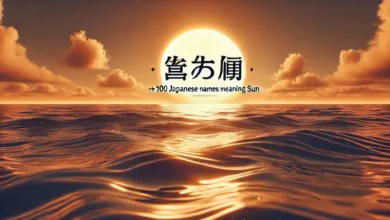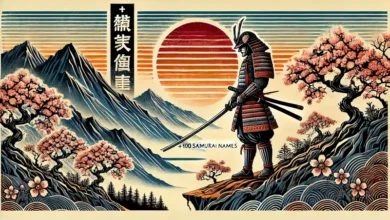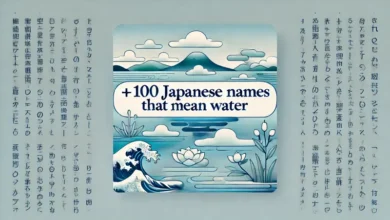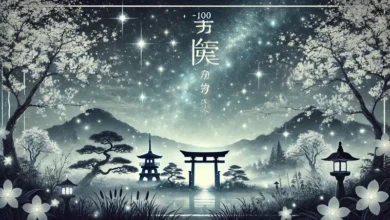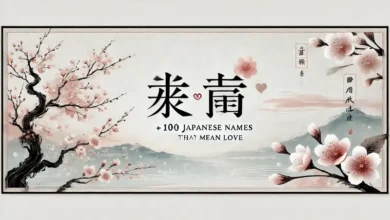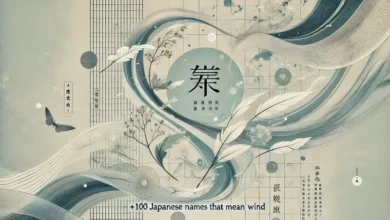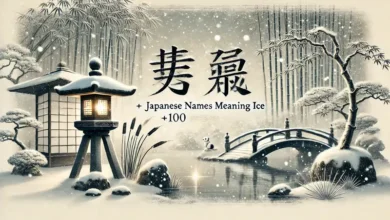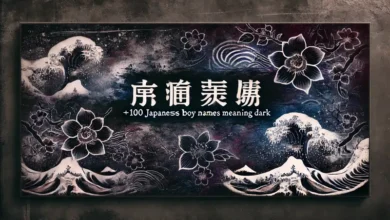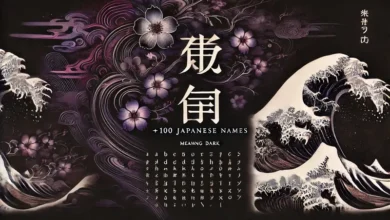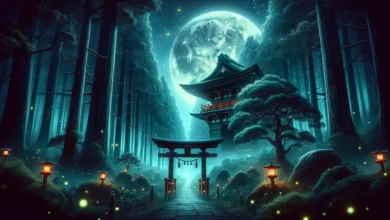Nature’s Gift: +100 Beautiful Japanese Names That Mean Flower
For copy name or description, please click on that!
| Name | Description |
|---|---|
Yuri (百合) | Means "lily." |
Kenshin (剣心花) | Means "sword and heart flower." |
Kazuki (和樹花) | Refers to "peaceful tree flower." |
Shota (翔太花) | Means "soaring flower." |
Shou (翔花) | Means "flying flower." |
Ever wondered about the beautiful meanings behind Japanese names? Many Japanese names are inspired by nature, and flowers, in particular, hold a special place in this tradition. In this article, we’ll explore the enchanting world of Japanese names that mean “flower,” and discover the symbolism and beauty behind each one. Let’s bloom together!
Female Japanese Names That Mean Flower
- Hana (花) – Directly means “flower.”
- Sakura (桜) – Refers to the iconic cherry blossom.
- Yuri (百合) – Means “lily.”
- Ayame (菖蒲) – Means “iris.”
- Tsubaki (椿) – Refers to the camellia flower.
- Botan (牡丹) – Means “peony.”
- Kiku (菊) – Refers to the chrysanthemum.
- Ume (梅) – Means “plum blossom.”
- Ran (蘭) – Refers to the orchid flower.
- Sumire (菫) – Means “violet.”
- Momo (桃) – Refers to “peach blossom.”
- Fuji (藤) – Refers to the wisteria flower.
- Hinagiku (雛菊) – Means “daisy.”
- Shion (紫苑) – Refers to the aster flower.
- Himawari (向日葵) – Means “sunflower.”
- Kanzashi (簪) – Refers to a traditional hair ornament with flower designs.
- Asagao (朝顔) – Refers to “morning glory.”
- Suzu (鈴) – Means “bellflower.”
- Hasu (蓮) – Refers to the lotus flower.
- Kaede (楓) – While primarily meaning “maple,” it symbolizes nature’s bloom.
- Yuzuki (優月) – Refers to “gentle moon,” often tied with flower-like qualities.
- Nadeshiko (撫子) – Refers to the pink dianthus flower.
- Tsuyu (露) – Means “dew,” evoking images of flowers in the morning.
- Tsubame (燕) – Refers to “swallow” but often linked with spring flowers.
- Kohana (小花) – Means “small flower.”
- Shizuka (静花) – Can be interpreted as “quiet flower.”
- Satsuki (皐月) – Refers to a type of rhododendron that blooms in May.
- Yuna (優花) – Means “gentle flower.”
- Aoi (葵) – Refers to “hollyhock.”
- Renka (蓮花) – Means “lotus flower.”
- Wakana (和花) – Means “harmonious flower.”
- Hoshika (星花) – Refers to “star flower.”
- Nozomi (望) – Meaning “hope,” often symbolized by blossoming.
- Shizuku (雫花) – Means “droplet flower.”
- Umeboshi (梅干) – Refers to “pickled plum,” which can be connected to the plum blossom.
- Azami (薊) – Refers to “thistle.”
- Suiren (睡蓮) – Means “water lily.”
- Haruka (遥花) – Means “distant flower.”
- Yūka (優花) – Refers to “gentle flower.”
- Sakuyo (桜世) – Means “cherry blossom world.”
- Kasumi (霞) – Means “mist,” often associated with mist-covered flowers.
- Hanan (花音) – Means “flower sound.”
- Mizuki (瑞樹) – Refers to “auspicious tree,” often blossoming with flowers.
- Miyabi (雅) – Means “elegance,” which can be tied to flower-like grace.
- Ichika (一華) – Means “one flower.”
- Kikuko (菊子) – Means “chrysanthemum child.”
- Kaho (花帆) – Means “flower sail.”
- Akihana (秋花) – Means “autumn flower.”
- Hoshimi (星見) – Refers to “star-gazing,” associated with night-blooming flowers.
- Rinka (凛花) – Means “dignified flower.”
Male Japanese Names That Mean Flower
- Haru (春) – Means “spring,” the season of blooming flowers.
- Ren (蓮) – Means “lotus.”
- Tsubasa (翼) – Means “wings,” symbolizing the flight of spring birds and flowers.
- Kaoru (薫) – Means “fragrance,” evoking the scent of flowers.
- Sora (空) – Means “sky,” often linked to flowers blooming under it.
- Akira (明花) – Refers to “bright flower.”
- Kiyoshi (清花) – Means “pure flower.”
- Hikaru (光花) – Refers to “shining flower.”
- Jin (仁花) – Means “benevolent flower.”
- Ryu (竜花) – Refers to “dragon flower,” symbolizing strength.
- Ichirou (一郎花) – Means “first son flower.”
- Shin (心花) – Means “heart flower.”
- Makoto (誠花) – Means “sincere flower.”
- Hibiki (響花) – Means “resonating flower.”
- Kenta (健花) – Means “healthy flower.”
- Shota (翔太花) – Means “soaring flower.”
- Yamato (大和花) – Means “great harmony flower.”
- Ryota (良太花) – Means “good flower.”
- Riku (陸花) – Means “land flower.”
- Takeshi (武花) – Means “warrior flower.”
- Takumi (匠花) – Means “artisan flower.”
- Souta (颯太花) – Means “flower in a gust of wind.”
- Minato (港花) – Refers to a “harbor flower.”
- Kaito (海翔花) – Means “sea-soaring flower.”
- Ryo (涼花) – Means “cool flower.”
- Yuki (雪花) – Means “snow flower.”
- Hiroshi (浩花) – Means “vast flower.”
- Hayato (隼花) – Refers to “falcon flower.”
- Kohaku (琥珀花) – Refers to “amber flower.”
- Isamu (勇花) – Means “brave flower.”
- Kuro (黒花) – Means “black flower.”
- Naoki (直樹花) – Means “honest tree flower.”
- Shigeru (茂花) – Refers to “lush flower.”
- Takao (高雄花) – Means “noble flower.”
- Nobu (信花) – Means “faith flower.”
- Masaru (勝花) – Means “victorious flower.”
- Kenshin (剣心花) – Means “sword and heart flower.”
- Taiga (大河花) – Means “great river flower.”
- Yoshio (良男花) – Means “good man flower.”
- Eiji (栄治花) – Means “flourishing flower.”
- Akito (晃斗花) – Refers to “bright fight flower.”
- Keisuke (恵介花) – Means “blessed flower.”
- Shou (翔花) – Means “flying flower.”
- Kazuya (和也花) – Means “peaceful flower.”
- Kenta (健太花) – Means “healthy flower.”
- Hiroto (浩斗花) – Refers to “great flying flower.”
- Reo (礼花) – Means “grateful flower.”
- Kazuki (和樹花) – Refers to “peaceful tree flower.”
- Shohei (翔平花) – Means “soaring peace flower.”
- Daichi (大地花) – Means “great land flower.”
Traditional vs. Modern Japanese Flower Names
When it comes to naming traditions in Japan, flowers have always held a significant place due to their deep symbolism in Japanese culture. Over time, the use of flower names has evolved, blending tradition with modern trends. Let’s explore the key differences between traditional and modern Japanese flower names, and what makes each style unique.
Traditional Japanese Flower Names
Traditional Japanese flower names have been rooted in the culture for centuries. They often reflect Japan’s reverence for nature, seasons, and the beauty of specific flowers that hold cultural or historical importance. These names are usually simple, elegant, and tied to seasonal flowers or natural elements that have symbolic meanings.
For example:
- Sakura (桜) – The cherry blossom, representing beauty and the transient nature of life.
- Ume (梅) – The plum blossom, symbolizing resilience and renewal.
- Kiku (菊) – The chrysanthemum, a symbol of longevity and imperial dignity.
- Botan (牡丹) – The peony, representing wealth, honor, and good fortune.
These names are often short, typically one or two syllables, and have been passed down through generations. They are timeless and continue to be widely used because of their cultural significance and deep-rooted meanings.
Modern Japanese Flower Names
In contrast, modern Japanese flower names tend to incorporate more creative interpretations, blending flower symbolism with contemporary elements such as nature, personality traits, or even other languages. They often reflect the parents’ desire to give their child a unique, yet meaningful name that combines the beauty of tradition with a modern twist.
Some characteristics of modern flower names include:
- Longer and more complex structures – Modern names often feature two or more kanji characters, combining floral meanings with other attributes such as light, hope, or strength. For example, Hanae (花恵) means “flower blessing,” and Yuzuki (優月) means “gentle moon.”
- Blending of concepts – Names like Himawari (向日葵), meaning “sunflower,” have become more popular as people look for cheerful, bright names with positive connotations.
- Creative combinations – Newer names may combine traditional flower names with modern concepts, such as Mizuki (瑞樹), meaning “auspicious tree,” connecting nature with a sense of good fortune.
Bridging Tradition and Modernity
Today, parents often seek to honor tradition while embracing modernity, choosing names that carry both timeless and contemporary meanings. For instance, a traditional name like Tsubaki (椿), meaning “camellia,” might be paired with modern kanji characters to create unique variations like Tsubasa (翼), which means “wings,” symbolizing freedom and aspiration.
In this way, Japanese flower names continue to evolve while maintaining a balance between the beauty of tradition and the creativity of the modern world.
